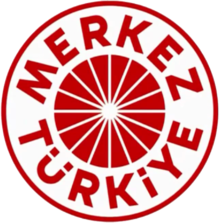Merkez Türkiye
| Central Turkey Merkez Türkiye |
|
|---|---|
 |
|
| Commercial? | Yes |
| Type of project | Planned megacity |
| Location |
Central Anatolia |
| Founder | Republican People's Party (CHP) |
| Key people | Kemal Kılıçdaroğlu |
| Established | 21 May 2015 |
| Funding | US$40 billion by the state and US$160 billion by the private sector over 20 years |
| Status | Proposed |
The Merkez Türkiye (English: Centre Turkey, Hub Turkey or Central Turkey) project is a proposal for a planned megacity put forward by Turkey's main opposition Republican People's Party (CHP) on 21 May 2015, as part of their June 2015 general election campaign. The project plans to utilise Turkey's strategic geographical positioning to establish a centre for global trade and commerce in Central Anatolia. It was branded as Turkey's 'economic empowerment project' (Ekonomi Yükseliş Projesi) and was nicknamed 'the Project of the Century' (Yüzyılın projesi).
The proposal was announced and made public on 21 May 2015 by the Republican People's Party (CHP), which nicknamed it the 'Project of the Century' and released a 7-minute video on YouTube containing details about the proposal. The project was seen as an attempt by the CHP to portray itself as a strong alternative to the governing Justice and Development Party (AKP) on infrastructure policy, since the AKP has drawn strong support in the past for its investment in new roads, airports and planned infrastructure projects such as Kanal Istanbul. Announced 17 days before the June 2015 general election, the project did not show a significant impact in the polls, with the CHP continuing to trail the AKP at 25-27%.
Amid the One Belt, One Road and the Maritime Silk Road initiative for the Silk Road Economic Belt, the Initiative for the Integration of the Regional Infrastructure of South America and the Kunming–Singapore Railway, Merkez Türkiye was designed to become the fourth of a group of global projects designed to connect different trade routes. The project aims to not just link roads and other modes of transport to increase trade, but to also link different world economies, industries, markets, cultures and lifestyles.
...
Wikipedia
